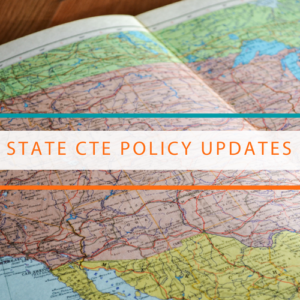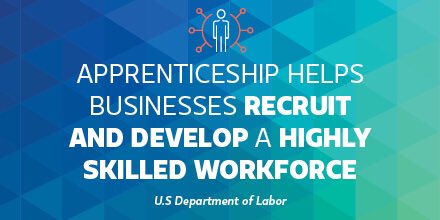In September 2022, Advance CTE and ECMC Foundation announced the second cohort of The Postsecondary State Career Technical Education (CTE) Leaders Fellowship at Advance CTE—Sponsored by ECMC Foundation. The Advance CTE — ECMCF Fellows include representation across multiple demographic categories reflecting the Fellowship’s goal of intentionally building a postsecondary leadership pipeline for underserved populations in Career Technical Education (CTE) that closes racial representation gaps and removes equity barriers to postsecondary leadership advancement.
This month, we’re excited to highlight two members of Advance-CTE’s second cohort of Postsecondary State CTE Leaders Fellows. In our interview with ECMCF Fellow Shelsi Barber-Carter (AR), she shared how participating in the Fellowship helped her gain confidence leveraging learner data to inform policies that shape CTE programs across the state.
 Tell me more about your journey to the Fellowship.
Tell me more about your journey to the Fellowship.
My journey to the fellowship is the result of networking and being strongly connected to like-minded individuals that play major roles in CTE. As an alumnus of the ACTE Next Level Fellowship, I found myself participating in activities and events that were held or affiliated with Advance CTE. As I attended those events, I heard so many great things about what Advance CTE was doing and how the organization provides greater opportunities for upcoming leaders in Career and Technical Education. With that in mind, I was really drawn to Advance CTE’s work, especially since it aligns so closely with my passion for improving outcomes for learners in CTE programs. As a former resident of rural Louisiana, I know that educational opportunities can be limited based on where you grow up; so, the way Advance CTE structures its approach to support states in providing access to high-quality CTE programming for every learner, regardless of their background, really spoke to me. During the time of my promotion to Louisiana Community Technical College System, my supervisor encouraged me to apply, especially since I was working more in the area of DEI at the time.
I will say, since I have been a part of the fellowship, Dr. Johnson and my mentor Dr. Shorter-Gooden have been so supportive in helping me to understand where I can have the greatest impact in my community without directly serving in a postsecondary role. They rock!
What skills or areas have you experienced the most growth in the program?
I’ve experienced a lot of growth in my skills around strategic planning and my confidence in working hands-on with data. I’m excited to be able to say that I’m truly data-driven, and I’ve been able to effectively leverage data in my presentations about the impact that poverty has on learners. To add, I believe the skills I have developed through the Fellowship are going to help me increase ways on how to bring about awareness and influence when supporting every learner in becoming successful citizens, including those from underserved communities.
Have you been tapped for new or more advanced roles within your organization as a result of your experience in the Fellowship?
Yes, I was recently promoted to the CTE Special Project and Jobs for Arkansas’s Graduates (JAG) Coordinator for the state of Arkansas. In this role, I’m responsible for overseeing all secondary and post-secondary JAG and college success programs. I have over 600 students on the secondary side and 12 postsecondary institutions that I oversee through the College Success program. I strongly believe participating in the Fellowship helped me become more comfortable in working in a CTE space while embracing a role that calls for me to articulate my knowledge and understanding of learner’s data as it relates to the policies and guidance that I am providing to my team. I also believe my experience in working with Perkins has helped me excel in this role.
How has your experience in the fellowship helped you explore new spaces or positions in postsecondary state CTE leadership?
With my experience in working with federal grants (Perkins and TRIO) and building partnering relationships with individuals from business and industry, I strongly believe the fellowship has allowed me the chance to openly connect and engage great leaders; as well as maintain important conversations about CTE with the decision makers in that space. For example, I recently met with one of our state higher education leaders and felt fully equipped to have that conversation. When I speak with someone, I have a purpose in mind. I have a goal in mind. And I think Advanced CTE really prepared me for that.
How has the Fellowship expanded your network?
Within the cohort alone- I’ve been able to network and bounce ideas off others to get a lot of great ideas about how to approach the work. Their perspectives have been invaluable, and I’ve been able to leverage this confidence and knowledge especially when I am speaking with state leaders about relative topics and issues that focus on the “learners’ voice in rural communities”.
Have you discovered new opportunities for what a role in postsecondary CTE could look like/ the responsibilities of such a position?
I would love to step into a role where I’m working in adult education and workforce. I’ve built a lot of knowledge through my work with secondary and postsecondary education under Perkins, so I believe I am better prepared now to speak to those areas; as well as assist and provide a service that will really show the type of work that I do.
A lot of the programs that I oversee include work-based learning, career development, internships, and apprenticeship programs. We connect learners with scholarships and job placements, so I am confident that there is a natural fit for me to step into a role on the workforce side of these programs.
If you have any questions, contact Shelsi Barber-Carter by email at [email protected]


 Congress Closes in on Temporary Funding Extension
Congress Closes in on Temporary Funding Extension Build Your Future is hosting a construction video contest, I BUILT THIS, and giving away more than $20,000 in prizes. Learn more and submit a video
Build Your Future is hosting a construction video contest, I BUILT THIS, and giving away more than $20,000 in prizes. Learn more and submit a video  Some states are exploring how to leverage apprenticeships to award college credit to learners. For instance, the Colorado legislature passed
Some states are exploring how to leverage apprenticeships to award college credit to learners. For instance, the Colorado legislature passed  The Partnership to Advance Youth Apprenticeship (PAYA), a multi-stakeholder initiative, just announced its nine grantees under the first joint philanthropic investment to expand youth apprenticeship in the United States. These grantees – selected from an extremely competitive pool of over 220 applicants from 49 states and Puerto Rico – will launch and expand high-quality youth apprenticeship programs in multiple cities, regions, and states, and in a range of industries. The grantee recipients are:
The Partnership to Advance Youth Apprenticeship (PAYA), a multi-stakeholder initiative, just announced its nine grantees under the first joint philanthropic investment to expand youth apprenticeship in the United States. These grantees – selected from an extremely competitive pool of over 220 applicants from 49 states and Puerto Rico – will launch and expand high-quality youth apprenticeship programs in multiple cities, regions, and states, and in a range of industries. The grantee recipients are: As the legislative session moves forward, states have passed laws to increase awareness of and expand access to Career Technical Education (CTE) opportunities for each learner.
As the legislative session moves forward, states have passed laws to increase awareness of and expand access to Career Technical Education (CTE) opportunities for each learner. (CTE) program of study, enhance the educational experience and better prepare learners for future career success. In June 2017, Advance CTE,
(CTE) program of study, enhance the educational experience and better prepare learners for future career success. In June 2017, Advance CTE,